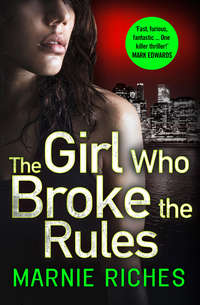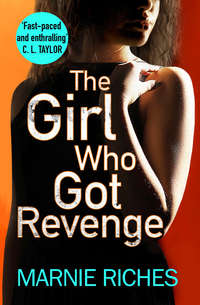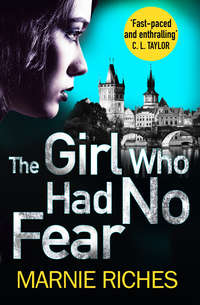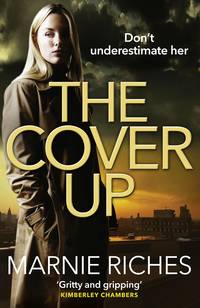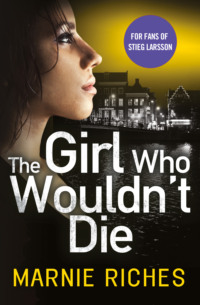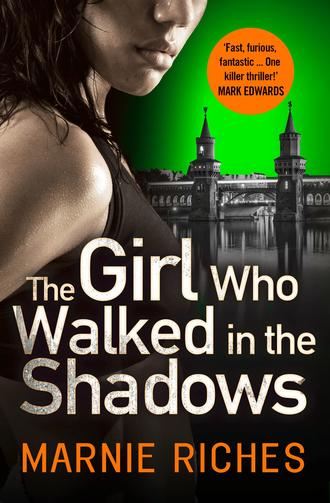
Полная версия
The Girl Who Walked in the Shadows: A gripping thriller that keeps you on the edge of your seat
‘I’m fine. I’ll meet you at the house.’
She was surprised by how strong her voice sounded. She didn’t feel fine. She felt like she was going to be sick. Pull yourself together, you weak woman, she counselled herself. You’ll get home. This will all be a big mistake. With a click of a switch, the window closed, shutting the irritating, well-meaning and concern of the policeman outside.
Pulling out of the parking space, she almost crashed into the police car. Almost. Not quite. She was fine. This was okay. It was going to be a mistake. Except she had that horrible feeling in the pit of her stomach. Not butterflies. More like flapping, desperate moths, blind to the direction in which the light lay.
Breathe in. Breathe out.
When they had turned up, in the middle of her fundraising presentation, at first she had been annoyed. Knock, knock on the door of the meeting room, right as she was delivering a heart-rending speech about the hope that the charity’s medical research brought to families affected by traumatic brain injury. The donor – a director in a multi-national mining company with a shocking health and safety record – had been rapt with attention; chequebook open, hoping to buy the company a better public image. But just as things were going well and she had enjoyed that rush she used to get back in London, when she had pulled off a particularly good PR campaign, propelling Schoen Engineering Systems to the top of the aerospace heap, they had barged their way in. Flashing ID.
Yes. She had had a bad feeling. The moment she had seen them in the doorway. Eyes only for her.
‘Can you come with us, please, Mrs Deenen?’
The policewoman’s face had been arranged into an expression of kindliness and sympathy. She wondered if the Dutch Police HR department had arranged training for that kind of thing. Body language was so important.
Now, her hands shook, though she was gripping the steering wheel as tightly as possible. Skin stretched tight over white bony knuckles.. As she waited at the traffic lights, fragmented thoughts punctured her apparent composure. Josh and Lucy missing. A slight chip on her bronze nail varnish. Trip to the nail bar was in order. But Josh and Lucy were missing. Missing.
The traffic lights turned to red. Slamming hard on the brakes, the police car almost ran into the back of her. Suddenly, her foot was disobeying her brain. Trembling. Jerking. Kangaroo petrol, she lurched away on green.
‘What do they mean, missing?’ she asked the road sign as she pulled into their street.
There were two police cars outside their hydrangea-fronted house. The lawn needed a trim, she noted. Her Dutch home in this Amsterdam satellite town – quiet but for the Schiphol to Rotterdam line that ran at the back of the long garden – was hardly in the same league as the Victorian house they had had in London. But at least it was detached. She didn’t feel ashamed to have the police officers in and offer them a cold drink. Perhaps Piet would already have made them one. The kids were almost certainly playing in the back garden in this weather.
The kids.
The kids weren’t playing in the garden. The police were here. Josh and Lucy were missing.
Almost ploughing into the back of a small white van that overhung the paved driveway by a small margin, Gabi parked up abruptly, only an inch or so between the bumper and the brick wall. Light-headed, she patted her hair. Phone. Bag. Keys. Going through the routine. Imposing some normality on the abnormal. Staring at everything but seeing nothing. Fingers fumbling with the fob. Locking the car. Turning her ankle as she walked in through the open front door. Unaware of the pain. Past the constable on the step, talking into his hissing walkie-talkie. He reached out to try to stop her but she strutted on into the kitchen.
Look for Lucy and Josh. They’ll be there. Sitting at the table, drawing. Bet Piet hasn’t washed their hands all morning. If they’re not there, they’re in the garden. Yes, they’ll be outside.
At her back, the police officers who had come to the office were saying something to her, though she wasn’t listening. She heard her name. ‘Mrs Deenen.’ But the rest was rhubarb, rhubarb, rhubarb.
‘Rhubarb,’ she said under her breath, remembering stage instructions for extras in the school play when she had been a child, though she had always taken the leading role. ‘Rhubarb.’ Josh’s favourite kind of crumble pudding, though Lucy often gagged on the stringy consistency.
Steeling herself to connect with here and now, Gabi took in her surroundings. So many police officers were encroaching on her space. There was a man in plain clothes, talking to Piet, taking notes at the island in the middle of the kitchen. He had a glass of water by his right hand. Good. Piet had offered them all refreshments.
Beyond, she saw the empty lawn. The enormity of the situation started to dawn on her.
Piet was crying, staring at her, with tears coursing down his cheeks. Red-eyed. Red-nosed. Snot on his upper lip and the white fluffy remnants of kitchen roll stuck in his stubble.
He held his arms out as he stood and stumbled towards her. ‘I’m so sorry, darling.’
Gabi put her bag carefully on the work surface. Pushed Piet back towards his stool, walked to the sink and washed her hands carefully, running the water until it was boiling hot. Rubbing and rubbing the astringent lemony hand-wash between her fingers. She dried her hands methodically on a clean towel. The garden appeared empty of children. Nobody on the slide. No Josh, jumping up and down on the sun-lounger, trying to launch himself onto his sister or clutching his ears as the train roared past.
The policeman who wore his own clothes was speaking to her – a detective. Yes. He must be a detective. She stared at him blankly. Little Gabi, blinded by the glare. Silenced by the attention. All eyes on her. Struggling to remember her opening lines. Rhubarb. Rhubarb. ‘You’re in shock, Mrs Deenen. Shall I make you a cup of coffee?’ a policewoman said. Who was she? Oh, that’s right. One of the constables who had shown up at the office.
‘Where are Lucy and Josh, Pieter?’ Gabi asked her husband. No longer was she a child. Big Gabi needed to take control of this shambles. Big Gabi would sort it. ‘What have you done with our children, you fucking useless bastard?’
She marched up to Piet and thumped him squarely on the side of the head, with such force, that he fell off his stool onto the kitchen floor. ‘All you had to do was babysit them for half a day, while I went in to give that presentation.’ Big Gabi was screaming. ‘And you couldn’t even do that. You miserable, useless fucking wimp.’
‘Mrs Deenen! Please to try stay calm.’ The detective grabbed her by the forearms. He was tall. Authoritative.
This badge-toting turd wasn’t the boss of her. She shook him off.
She ran into the garden, screaming at the top of her lungs. ‘Josh! Lucy! Mummy’s here. You can come out now!’
‘Can you think of anyone who might have taken them, Mrs Deenen? A relative? A friend? Neighbour?’ the detective asked. He had followed her outside. Now, he was standing between her and the climbing frame.
Interfering pain in the arse, she thought. She could find her own children. They were obviously just playing hide and seek.
‘Move! I want to check under there,’ she said, pointing to the void beneath the platform.
‘We’ve had a team combing the garden and all along the train track at the back for the last hour. There’s no way in. There’s no way out. The train track is clear for a mile in each direction, though they’ve stopped the Schiphol to Rotterdam service until we’ve searched the entire line. No trace of them.’
When she tried to push him aside, he stood his ground.
‘Mrs Deenen. Your children aren’t hiding, I’m afraid. They’re gone. They can’t have wandered off. They’re not in the house or the garden. They’ve been taken. Abducted.’
Gabi looked at the Sesamstraat tricycle and an abandoned Iggle Piggle doll Lucy had brought from the UK. She sank to her knees, arms crossed tightly over her bosom. Big Gabi, wrapping Little Gabi in a protective embrace. Keening. Cursing god that her babies were gone. That her life had been thrown into chaos.
‘This can’t be happening. This can’t.’
The detective put a large hand on her shoulder. ‘I’m so sorry.’
CHAPTER 13
The City of London, 5 March, present, mid-morning
‘My Lord,’ the chauffer said, holding the door of the Rolls Royce wide. He touched the brim of his cap.
Gordon Bloom shook his head. He looked longingly at the plush cream and truffle interior of his car; he knew that the heated leather seats would offer some measure of comfort in these infernal sub-zero temperatures. Last night on the TV, the weatherman had been bleating on about Arctic Sea ice melts causing high-pressure weather systems over the Barents Sea and northern Russia, icy wind blasting mainland Europe and the UK as a result. Nobody had seen off-the-charts temperatures like this in England since the big freeze of 2012. Global warming or some bullshit. Whatever the cause was, he was sick of it. Sick of having to wear uncomfortable thermal underwear. Tired of having to be driven everywhere. Bored with being under constant scrutiny since Rufus’ death.
‘Thanks, Kenny, but I’ll walk,’ he said, stamping his feet. The snow at least a foot deep, even in EC1 where his meeting had taken place. Strange, to sit at the head of a boardroom table, discussing a major acquisition and then having to change back into skiwear in the men’s. A man like him shouldn’t be inconvenienced by this nonsense. Though he may not quite have all the money in China, his assets bettered many a country’s GDP. He was an übermensch, after all. A Titan from a long line of Titans. Shame then, that those like him blessed with demigod status couldn’t control that insane bitch, mother nature. ‘It’s not far. You can pick me up afterwards. Go and treat yourself to a hot coffee and a cake or something.’ He unfurled a twenty from his wallet. ‘You need a break. I need some air. This weather is making fools of us all.’
Kenny touched the brim of his cap again, and pocketed the twenty. ‘Mental, isn’t it, my Lord?’ he said, his breath steaming on the air as he blew uselessly into gloved hands. The broad, older man wore a smart coat in thin fabric – far too flimsy for this weather. His wind-burned face and bulky build gave him the appearance of a builder nearing retirement, at odds with the dapper uniform of someone who drove a Rolls Royce for a billionaire.
Bloom remembered his father’s driver. Jenkins, wasn’t it? He had been cut from similar cloth. Poor old bastard. He made a mental note to furnish Kenny with a better coat. And a gun. Definitely time he had a gun.
‘It never snows in central London,’ Bloom said, pulling the fox fur flaps of his Russian hat down over his ears, obscuring his peripheral view of this blinding winter wonderland. The chrome pipes and corkscrews of the Lloyds building towered above him like a bartender’s tool kit, thrown into an ice bucket. ‘People skating on the Thames! How is that even bloody possible?’ The icy air made his filled tooth sensitive. He winced.
‘It’s a long way to Southwark Cathedral, sir,’ Kenny said, closing the car door with a thunk. ‘You sure? Police said you shouldn’t go anywhere unescorted.’
Bloom nodded. Squeezed his eyes shut. Showed he appreciated Kenny’s concern for his employer. But inside his gloves, he balled his fists at the thought that the police should dictate to a man like him what to do and where to go in his city. ‘I need a bit of space. Especially today. You know?’
Kenny cocked his head to one side. Narrowed his eyes. A gap-toothed half smile whispered uncertainty.
‘Don’t worry. I’m a big boy.’ He patted the driver’s arm.
‘Of course, sir. As you wish.’ His formal, stilted turns of phrase always sounded stiff and superficial, with that horrible east end accent. Bloody performing monkey.
Sighing deeply, Bloom turned towards Leadenhall Market. Trudging through the snow, he headed through the brief, dry respite that the gaudy red and gold Victorian arcade offered. Glum in the post-Christmas slump, where all the Yuletide tat was now 75% off, hanging unwanted on rack after rack.
He looked up through the vaulted glass ceiling, blurred around the edges by his halo of grey fur, and saw that the sky was perfectly white. Then, peering through the opening at the far end which led in the direction of Bishopsgate, he could see fat flakes start to come down again. Unrelenting. Forcing the grey-faced denizens of the City of London to hasten home early before public transport ground to a halt. Ice on the roads. Wrong kind of snow on the train lines. Broken-down, blizzard-blinded this and that.
He would definitely be better off crossing London on foot. Catching sight of himself, reflected in a men’s suiting shop window, he decided that he looked like an Inuit. Unrecognisable with the hat on and the glasses. On the periphery of the reflection, he barely registered a shuffling figure several paces behind him.
But never mind that. He was thinking about Rufus.
The memorial service was a nice idea, in light of the fact that the police were still refusing to release the body. Everyone would be there, of course. Rufus’ widow, sobbing, no doubt. He had always wanted to fuck her. Maybe now, he would have his chance. Hadn’t Harpers named him as Europe’s most eligible bachelor? Yes, he would enjoy sliding his hand between her gym-honed thighs. Riding her throughout the night, innocently comforting her throughout the mourning.
Rufus’ beleaguered children would be there too, wondering what the hell they had done to have their father taken away from them. Squalling, snot-nosed pug-faced little fuckers of ten, six and three. Jesus. The fallout the murder had caused was unimaginable, the most unfathomable injustice being his own loss of a trusted super-lackey and friend of old.
The press would be gathered outside, no doubt, snapping the staff of Bloom Group plc, as they entered the hallowed cathedral to bid farewell to their Chief Executive, dabbing at their eyes to show their commitment to the company, whether they had ever met Rufus or not. Nobody had liked him, that’s for sure.
Gordon Bloom allowed himself a wry chuckle as he neared London Bridge. He looked into a café window at all the city office workers, trying to thaw themselves out by wrapping their gloved hands around cups of steaming coffee. He caught sight again of the shuffling figure, some way behind, entering the reflected scene as he exited, huddled up in clothes that seemed too big for him. Perhaps a homeless man, making his way towards a shelter. Nothing to worry about, though Bloom did pick up his pace. Tripped on a kerbstone as he crossed the slush-logged street onto the Bridge itself. He had difficulty with his depth perception these days. The surgeon had said the ocular nerves were too badly damaged. At least the glass eye was the finest money could buy. Couldn’t be helped. If the worst thing that ever befell him was visual impairment, he was doing reasonably well. Better than Rufus, at any rate.
As he crossed London Bridge with snow whirling around him, settling on his hat, drip-dripping freezing water onto his tingling nose where it melted, he imagined himself trapped inside a snowglobe. No escape from this claustrophobic scene. Just falling snow and the same chain of events replaying in his mind.
He and Rufus had had lunch. They had parted company. Now, Rufus was dead. Drowning by snow. Holes in his neck like the Devil’s stigmata.
Who was this Jack Frost that the press referred to? Why had he wanted Rufus Lazami dead? Was he, Gordon Bloom next on the hit list?
Glancing behind, he was pleased to see the homeless man was no longer on his tail.
‘Stop being so easily spooked, you bloody idiot,’ he counselled himself, clutching the handrail as he made his way down the gritted stone stairs to Southwark Cathedral, where he would say goodbye in public.
Cameras flashing, as anticipated. Paparazzi pests, swarming like unseasonal flies on a frozen carcass.
‘Lord Bloom! Aren’t you worried that Jack Frost will come after you?’
He was careful to maintain an air of sobriety. ‘I am here to bid adieu to a dear friend and longstanding business partner. Thank you. Good day.’
Their voices rang in his ears, as he stood in the threshold of Southwark Cathedral’s great stone hall.
‘Are you taking measures to protect yourself, Lord Bloom?’ they shouted.
Inside, an organ ground away at a hymn he didn’t recognize. The place was packed with mourners wearing snowboots and colourful ski-jackets that were at odds with the sombre occasion. All eyes were on him. He nodded to the young man with the plucked eyebrows who stood in the aisle, ushering family to the left and business colleagues to the right. Recognised him as one of his rising stars.
At his back, the journalistic hordes continued to bay for a response.
‘Is it true that the killing was ordered by someone in the criminal underworld? Did Rufus Lazami have many enemies?’
Their questions bounced off him thick and fast; those cadaverous flies throwing themselves against a sealed window. He would not answer. He would not give them the satisfaction. Let the press and Scotland Yard keep digging. They wouldn’t find a fucking thing.
CHAPTER 14
London, Westminster, later
‘What are you going to do?’ Sophie asked, her Doc Martens scuffing up snow onto the hem of her floor-length batik-print skirt. She grabbed George’s hand, as they walked along Millbank.
The Thames was on their left, a white ribbon twisting through a cityscape that looked like it had been dipped in liquid nitrogen. On their right, Millbank Tower loomed: a 1960s brutalist monolith with windows. Somewhere, on one of those dizzying levels that stood sentinel over Albert Embankment, the Open Society Foundation was situated.
George shook Sophie’s hand loose, swiftly switching her rucksack to her right shoulder to prevent her from trying to hold her hand again. She sighed heavily. Wondered whether to say anything about this unlooked-for physical contact. Perhaps some things were better left unsaid. ‘I don’t know. Sally’s on my case. The Home Office is burning my ear about deadlines. If I don’t find that fucking laptop and my USB stick, I might as well apply for a job stacking shelves at Tesco. Maybe my Aunty Shaz can get me back my old cleaning job at the titty bar. It’s at least a years’ worth of work. Gone. Just like that.’
‘What did the pigs say?’ Sophie asked. Her earrings, necklaces and the buckles on her flowery satchel jangled as she walked.
‘Don’t call them the pigs,’ George said. ‘My partner’s a Chief Inspector in the Dutch police.’
‘Your partner? You were slagging him off the other night. Blows hot and cold, you said.’
‘That was then. A lot’s happened since.’ George noticed the expectant expression on her newfound friend’s face. She remembered the awkward moment when Sophie had propositioned her in the pub, and regretted even having asked her back for a coffee with no strings. Today, every gesture of camaraderie seemed like a cloying advance. Every knowing glance on the tube had felt overly suggestive. ‘Right now, I wish I had six foot five of policeman to stand guard over my place. It’s freaky having someone go through your stuff. It happened to me when I was living in Amsterdam.’ She shuddered, thankful for the long johns she wore beneath her jeans, though it was the memory of the Firestarter, touching her things in the little bedsit above the Cracked Pot Coffee Shop that caused the hairs on her skin to stand on end.
The brightness of Sophie’s green eyes seemed suddenly dimmed, or was it just the shadows cast by the covered approach to Millbank Tower’s lobby? George quietly chastised herself for being arrogant.
‘You’re welcome to stay on my sofa again tonight, if you want,’ Sophie said, holding the door open for George. ‘I might not be able to offer you pig protection, but at least I’m on your doorstep if you need me.’
Sophie’s sofa had been less than comfortable. A battered old thing, covered in cigarette burns and cat hair. Next to it, a large coffee table, festooned with carelessly abandoned coffee cups, wine glasses, ashtrays, Rizla packets, a hairbrush, several hefty academic books and the latest by Donna Tartt. But the anticipation that George would join Sophie in bed in the middle of the night had occasioned something far worse than simple discomfort. It had brought on an unwelcome bout of insomnia.
‘Darkest hour is just before dawn,’ George muttered beneath her breath, remembering how the night had felt like it would never end.
‘What?’ Sophie asked.
‘Nothing.’
Together in the cavernous reception area, they signed in. All brown, white and black marble harked back to a time when London was swinging and fabulous. Now, rendered fashionable again by a passion for all things mid-century, George reflected. If she could only afford her own place, she might go for that retro-look too. In fact, she’d settle for bloody Ikea if it came to it. As long as it was hers.
High above the city, George and Sophie sat in comfortable armchairs. Biscuits artfully arranged on a plate. Herbal tea in hand-painted mugs. They were facing a dumpy middle-aged project worker called Graham Tokár. He oozed well-meaning and an energy that almost audibly crackled, directed, quite plainly, towards Sophie. Had Sophie at some juncture also offered him a fuck in a pub over a burger, George wondered?
‘So, I’ve told George, here, about the charity funding initiatives that lessen the poverty and social exclusion of the Roma,’ Sophie said.
‘That’s right,’ Graham said, angling his body towards George but not tearing his gaze from Sophie’s eyes. ‘Musical institutes. Education grants. Lobbying European parliament for change. We work with the poorest people in some of the most financially stagnant and racist environments in Europe.’ He finally looked at George. The spark had vanished. ‘And many of the staff, Europe-wide, are Roma too. Like me. I’ve got a Scottish mother, but a Hungarian Roma dad.’
George looked down at her notes. She followed the line of her pad to Graham Tokár’s shoes. He had a piece of chewing gum stuck to the heel of his left foot. This much, she could see, as he crossed his legs. In his right ear, he wore a small, silver sleeper. He was clearly an articulate and interesting man, but she hated his earring. His ears were wrong.
‘You know you’ve got an infection in your piercing,’ she said, pointing to the inflamed flesh of his earlobe.
He touched his ear self-consciously. George made a mental note not to shake his hand when they left.
‘Have I?’ he asked, face flushing red right up to his hairline where his greying hair had started to thin. ‘Oh, well, did Sophie tell you about—?’
‘Look,’ said George, blinking hard. Checking her phone. No messages from the police about her stolen laptop. Shit. ‘I’m a criminologist. I’m doing research into trafficking. Not the Roma. Sophie asked me to come here today, and it’s nice of you.’ She rammed a biscuit hastily into her mouth. ‘And these biscuits are great.’ Speaking with her mouth full. ‘But to be honest, I can’t see the point—’
George could feel her colleague’s eyes boring into the side of her head. She felt instinctively that both Sophie and this charity project worker thought her an outrageous arsehole. Was she being rude? Probably.
‘I spend a lot of time in prison,’ she said by way of an apology. ‘I’m specifically interested in hearing how the Roma are embroiled in human trafficking. As victims. As perpetrators. Anecdotes. Groups you can put me in touch with. Stats. That sort of thing.’
Graham Tokár was looking at her with his mouth hanging slightly open. He glanced at Sophie, a look loaded with judgemental import.




